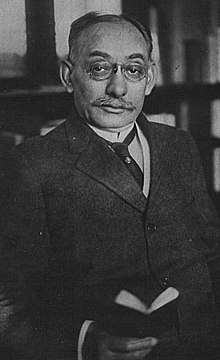Walter Hines Page
Walter Hines Page (born August 15, 1855 in Cary , North Carolina , † December 21, 1918 in Pinehurst , North Carolina) was an American journalist , publisher and diplomat . During the First World War , Page was the American ambassador to Great Britain and was instrumental in the USA's entry into the war.
Live and act
Walter Hines Page, the brother of Congressman Robert N. Page , studied at Trinity College ( Duke University ), Randolph-Macon College and from 1871 to 1878 at Johns Hopkins University . After completing his studies, he began his journalistic career as editor of the Saint Joseph Gazette in Saint Joseph , Missouri (1880-1881). From 1898 to 1899 he was editor of the literary magazine The Atlantic Monthly . On January 1, 1900, he became a partner and vice president of Doubleday , Page and Company , and founder and editor-in-chief of the monthly magazine World's Work (1900). In his work, the journalist distinguished himself mainly as a fundamental supporter of the Democrats , who advocated social reforms and equality . In his paper The Rebuilding of Old Commonwealths , published in 1902 , he called for accessible education for everyone, regardless of their social origin , race or religion . As an election worker, Page supported the Democratic US President Woodrow Wilson , who appointed him US Ambassador to Great Britain shortly before the start of the war.
The First World War
Walter Hines Page was one of the key figures who pushed the USA into the world war: Convinced of the war guilt of the German Reich , Page demanded the immediate diplomatic and economic support of the allied powers of the Triple Entente by the USA and criticized Woodrow Wilson's neutral position ( Neutrality Policy) by defending British policy towards Wilson and thus weakening the position of the US President. In 1915, Page criticized the President's moderate response to the demise of the RMS Lusitania and Edward M. House's peacekeeping mission the following year, 1916. On March 5, 1917, shortly before the United States entered the war, Page sent a message from London to Wilson in the He warned that the Anglo-French front would collapse if help did not come from the USA soon, and called for financial support and the use of naval forces of the United States Navy . (This event correlates with the announcement of the Zimmermann dispatch on March 1, 1917). A month later, on April 6, 1917, Congress declared war on Germany.
In Washington, the pro-British conduct of Page was now understood as " Anglophile propaganda", led to a break with Wilson and discredited the ambassador in his home country. Although his health was already badly damaged, Page kept his post as ambassador until August 1918 and died four months later. In 1918 he was elected to the American Academy of Arts and Sciences . Walter Hines Page is buried in the Old Bethesda Cemetery in Aberdeen , North Carolina.
aftermath
- The correspondence and biography of Page published by Burton J. Hendrick under the title The Life and Letters of Walter H. Page was awarded the Pulitzer Prize in 1923 ; The Training of an American: The Earlier Life and Letters of Walter H. Page, also by Burton J. Hendrick, received the Pulitzer Prize in 1929.
- The Walter Hines Page High School in Greensboro , North Carolina and the Walter Hines Page Research Professor of Literature at Duke University in Durham remember the important son of the State of North Carolina.
bibliography
Writings by Walter Hines Page
- 1902: The Rebuilding of Old Commonwealths
- 1905: A Publisher's Confession
- 1909: The Southerner , novella, reissued: University of South Carolina Press, 2008, ISBN 978-1-57003-729-0
literature
- Ross Gregory: Walter Hines Page: Ambassador to the Court of St. James’s . (1970) New edition: The University Press of Kentucky, Lexington 1982, ISBN 0-8131-1198-6
Individual references and sources
- ↑ a b Encyclopedia of World Biography on Walter Hines Page. Retrieved April 30, 2008 .
Web links
- Walter Hines Page - biography on knowsouthernhistory.net
- Literature by and about Walter Hines Page in the catalog of the German National Library
- Newspaper article about Walter Hines Page in the press kit of the 20th century of the ZBW - Leibniz Information Center for Economics .
- Search for Walter Hines Page in the SPK digital portal of the Prussian Cultural Heritage Foundation
| predecessor | Office | successor |
|---|---|---|
| Whitelaw Reid |
US Ambassador to London May 30, 1913–3. October 1918 |
John W. Davis |
| personal data | |
|---|---|
| SURNAME | Page, Walter Hines |
| BRIEF DESCRIPTION | American journalist, publisher, and diplomat |
| DATE OF BIRTH | August 15, 1855 |
| PLACE OF BIRTH | Cary , North Carolina |
| DATE OF DEATH | December 21, 1918 |
| Place of death | Pinehurst , North Carolina |

